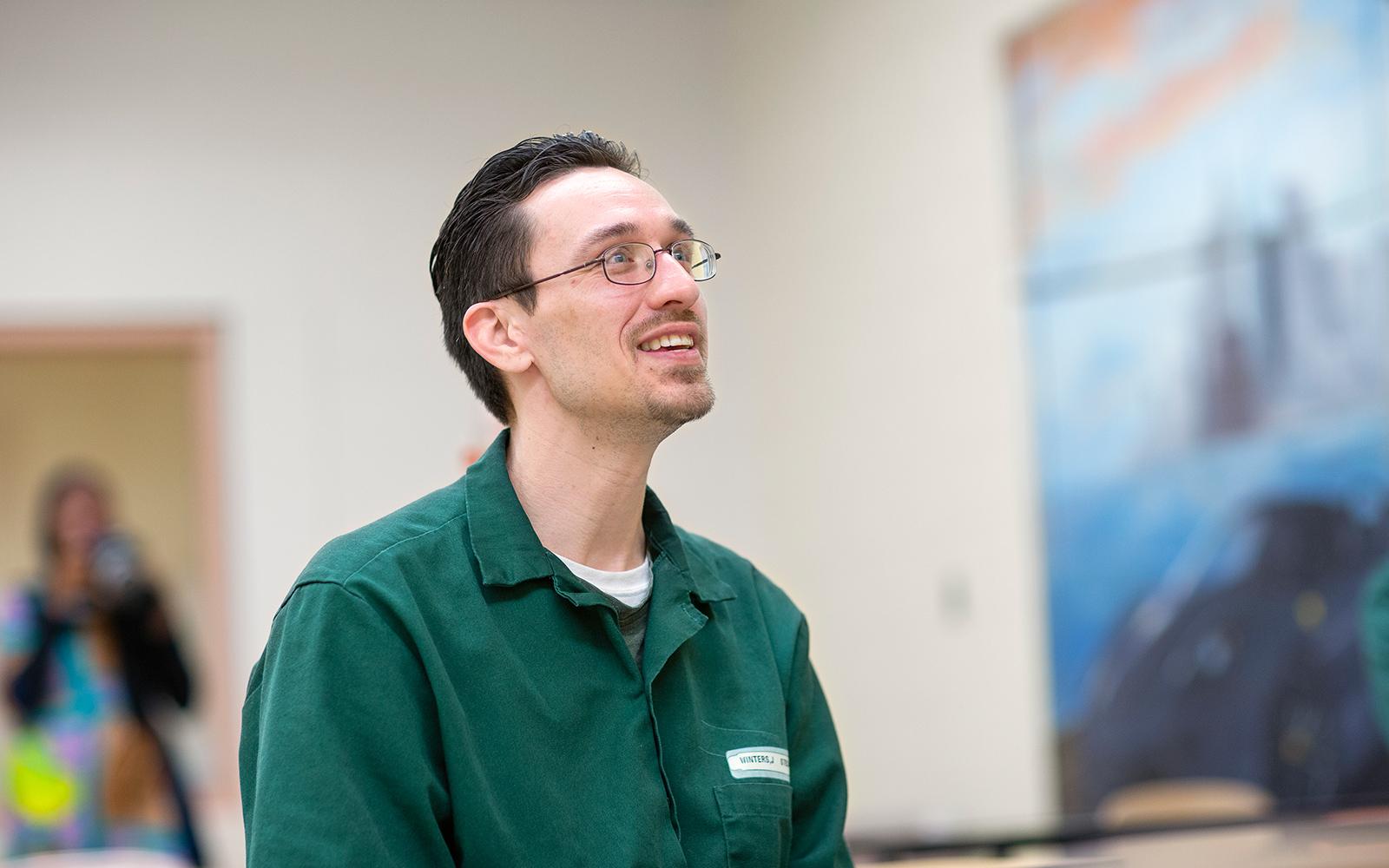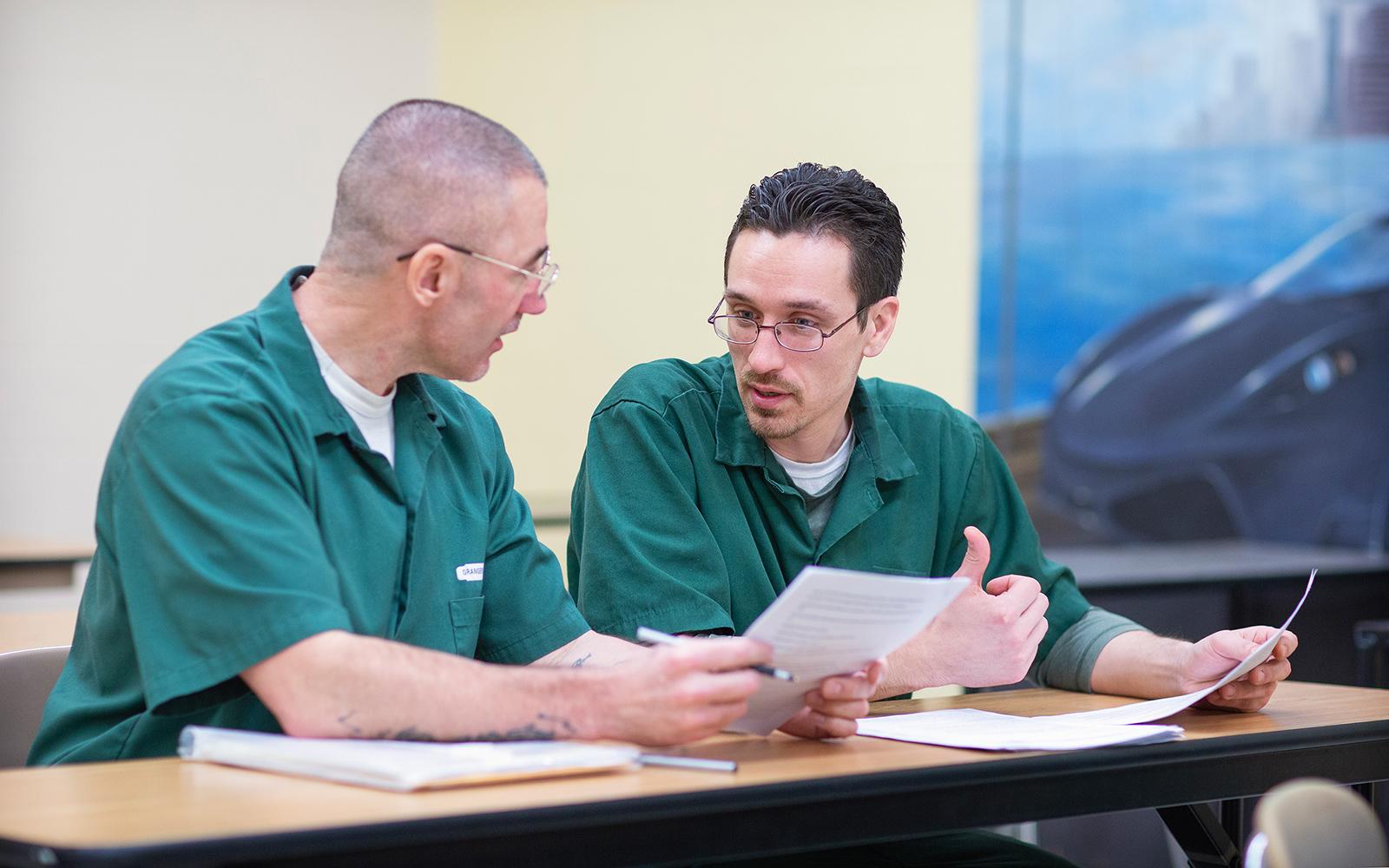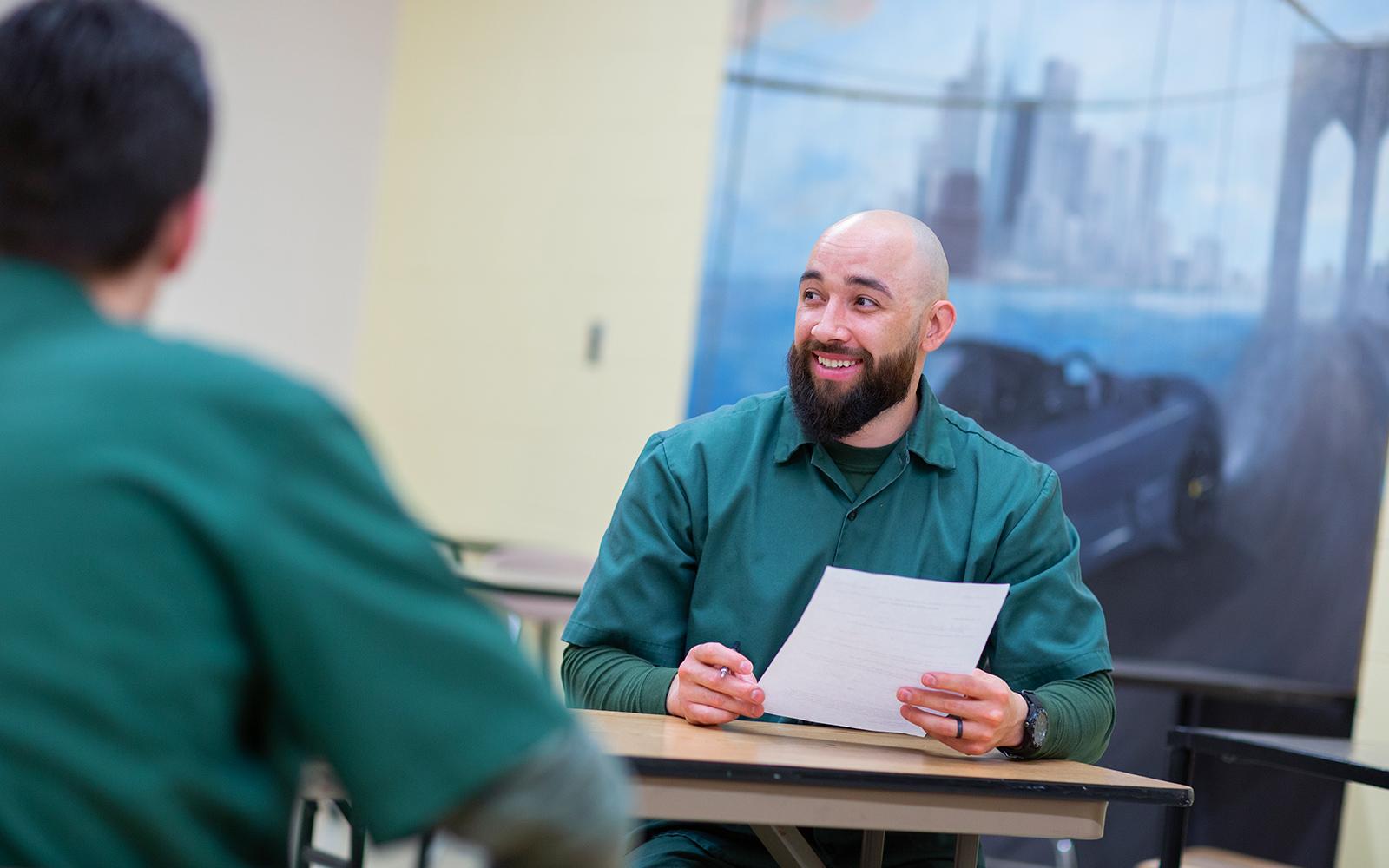In some ways, Jake Winters ’24 is your typical college student—passionate about his major, dealing with loud roommates, and anxious about what his future will hold after graduation.
But unlike most of his SUNY Potsdam classmates, Winters’ campus is located entirely behind prison walls, as he completes his degree and his sentence at Riverview Correctional Facility in Ogdensburg, N.Y.
“I’ve been on a journey for so long. This is an opportunity to be part of something bigger than myself that’s positive. It’s one of the few true things to do here that’s positive.”

Jake Winters ’24
Jake is one of approximately 40 students in Potsdam@RCF, a federally recognized Second Chance Pell program, which allows incarcerated individuals to complete a Bachelor of Arts degree in sociology through SUNY Potsdam while they serve their time at Riverview.
“It’s amazing to see a whole group of guys developing and changing together. We’re working on creating a college culture in prison,” Winters said. “The professors really show how much they care. It’s so encouraging to know that they have my back.”
Now, the first cohort of students is getting ready to graduate—including Winters. The professors are planning a small celebration at the facility, and graduates can invite their families. It’s an occasion Winters would never have expected, not that long ago.
“I never got to walk the stage for my high school graduation, so this will be my first time,” he said. “I think about how far I’ve come from the young 18-year-old who thought he had it all figured out. I want to give back a bit, to see if I can help others reach their potential too.”
A second chance
The SUNY Potsdam program is one of a select few baccalaureate programs offered through the Second Chance Pell Experiment, created by the U.S. Department of Education to help incarcerated individuals access higher education, with the goal of better preparing them for reentry into the job market and society. SUNY Potsdam became the first comprehensive campus in the State University of New York to offer a bachelor’s degree through the program in 2020, joining 11 other community colleges offering associate degree programs at institutions across the state.
“While others see our students as offenders first, we see them as students first,” said SUNY Potsdam Professor Dr. Nancy Lewis, director of the Potsdam@RCF program.
The Potsdam@RCF program allows students to complete a sociology degree, and add a minor in human services, or complete credentials such as peer recovery coach or mental health first aid.
“I find it fascinating that the scholarly research demonstrates how people who participated in college program while incarcerated have a lower rate of returning to prison. In fact, a study done in New York State examining the Bard Prison Initiative demonstrated a 4 percent recidivism rate, and as the student completed more college credits, the recidivism rate moved lower,” Lewis said. “For a person completing a BA (Bachelor of Arts), the recidivism rate was 0. I find this result astonishing! What is it about a college education that translates into so few returns to prison? No other program offered in prison can boast such a result!”
The vast majority of incarcerated people will one day return home, and providing access to postsecondary education in prison means that these individuals are far less likely to recidivate and are better equipped to play productive and positive roles within their communities. Research also shows that access to postsecondary education improves prison safety for both incarcerated people and corrections employees alike.
A college culture, in prison
Classes are taught in dedicated college classrooms in the Riverview facility, complete with posters showing the SUNY Potsdam campus, with lists of students who made the President’s or Dean’s List tacked up outside the door. If it weren’t for the corrections officers occasionally peeking through the window or the students’ matching khaki green uniforms, you could almost momentarily feel as if you were in an older classroom on the main campus.
The faculty work hard to tailor their courses so that they adhere to all the security requirements, while still providing the rich academic experience SUNY Potsdam is known for. The Department of Sociology and Criminal Justice supports a number of major-related courses, while faculty from all disciplines have stepped up to offer general education classes—from history to chemistry (with modified lab assignments) and even yoga, to fulfill a physical health and wellness requirement. St. Lawrence University, Canton, is the junior partner for the project, and will provide one course per semester to support the program beginning this fall.
“There’s this initial rush at the beginning of the semester, with all of this work and these deadlines to meet. I remember initially when I first got in, it would take me like 20 hours to write an essay. It’s loud here, and everything echoes. There’s really no quiet time. So you have to learn to find your flow,” Winters said. “But at the end of the semester, there’s always a feeling of accomplishment, when you know you worked hard and did your best. The feeling is indescribable.”
Winters is entering his senior year in the program, which just also happens to be the final year of his sentence. He’s set to be released in June 2024, a month after receiving his SUNY Potsdam degree. Thinking about the future, Winters expresses a deep sense of remorse and a determination to make something of the chance he has been given.
“One thing this program has done is help my parents and friends to see the growth in me, to stop seeing me as the young man who threw his life away. Now, I have the blessing of another chance… I could have been sentenced to life without parole. Instead, I was sentenced to 20 years, with five years of post-release supervision. There was a chance I could never do anything again. So I need to do something with my chance now.”

What does that mean? In the short term, Winters has pretty modest goals—perhaps working with his hands, as he acclimates to life on the outside. After that, he’s curious about pursuing graduate study or a law degree. No matter what, he’s determined to give back in some way.
“I see the way others have helped me—for example, professors, facility staff and even officers—and now I want to find a way to help my community. I want to give back, to see if I can help others reach their potential,” he said. “There are so many people struggling out there, with structural issues working against them that make it harder than it has to be.”
That’s exactly the outcome Dr. Lewis was hoping for when she completed the proposal for the Second Chance Pell project, along with Rivka Eckert (Assistant Professor of Theatre and Dance, SUNY Potsdam) and Dr. Liz Regosin (Charles A. Dana Professor of History, SLU).
“Many people I work with in custody and following release choose careers that focus on helping others as pathways to productive lives, allowing them to give back to their families and communities. The Department of Labor identifies community development, social services and substance abuse treatment as areas of above average job growth. This degree will provide a productive pathway forward as the students rebuild their lives,” Lewis said.
‘My life has turned 180’
Edgardo Aponte first heard about Potsdam@RCF from another student, Brandon Rodriguez ’24, who told him he was going to transfer from Ogdensburg Correctional Facility to nearby Riverview in order to complete his bachelor’s degree.
“Brandon told me he was going to a different facility and enrolling in college. He wanted to know if I was interested in taking his job when he left. I said, ‘I don’t want your job! How do I go with you?’” Aponte said.
After getting Dr. Lewis’ contact information, Aponte asked his wife to email the professor, to help him find out the next steps to enroll. Once he was finally transferred to Riverview and started taking his first classes, he quickly saw that he was in for a challenge.

Edgardo Aponte
“A lot of people assume that we have all this time on our hands to fully dedicate to college, but it’s challenging. The atmosphere itself, this environment is not always conducive to studying,” Aponte said.
He still found a way to succeed, though—even discovering to his surprise that he enjoyed a challenging chemistry class and was doing well enough that he could help his classmates with the assignments. Now, Aponte leads orientation for new recruits to the program.
“In a room of 10 to 15 guys, I share what I went through and my experience in my first semester. I try to show that even though my first language wasn’t English, I was still able to do it. I want people to see that they can do this too and understand how education opens up doors,” he said. “When I am encouraging guys to join, I always share the notion that there’s really nothing better than this in prison. It has transformed our lives and will transform their lives too.”
After spending five semesters in the program and completing many of his general education requirements, Aponte had a heart to heart with Dr. Lewis, as he thought about his future options. He felt drawn to another program that would bring him closer to his wife and children in Long Island, allowing him to get a degree in architecture and engineering technology as he wraps up the final two years of his sentence. Even as he got ready to transfer, Aponte was grateful for everything he had learned.
“My life has turned 180 [degrees]. The things I value will live with me for the rest of my life: education and family,” Aponte said. “There are things you are still able to obtain in here—ideas and the ability to understand and care for others.”
—Article by Alexandra Jacobs Wilke, photography by Jason Hunter
